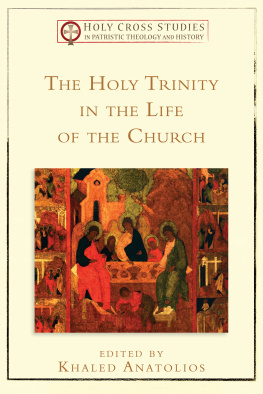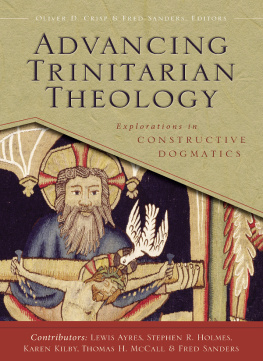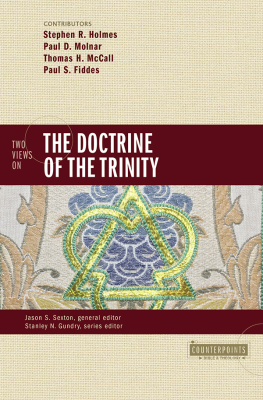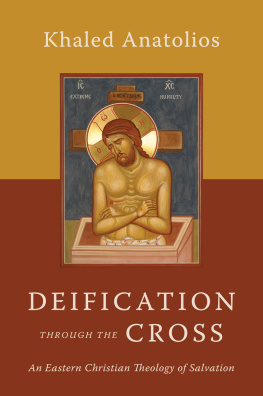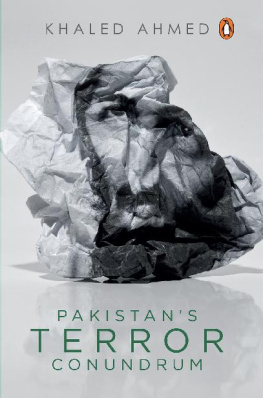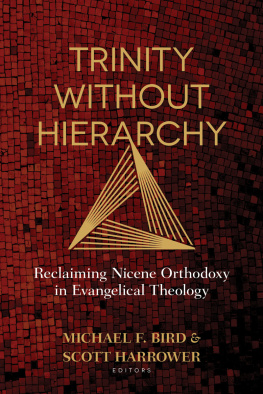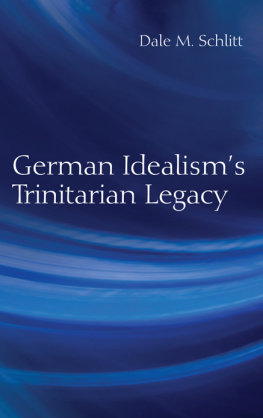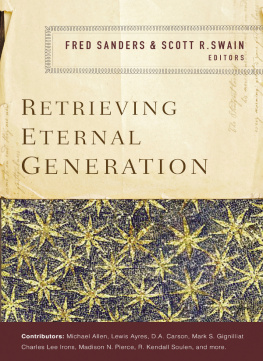Khaled Anatolios - Retrieving Nicaea: The Development and Meaning of Trinitarian Doctrine
Here you can read online Khaled Anatolios - Retrieving Nicaea: The Development and Meaning of Trinitarian Doctrine full text of the book (entire story) in english for free. Download pdf and epub, get meaning, cover and reviews about this ebook. year: 2011, publisher: Baker Publishing Group, genre: Religion. Description of the work, (preface) as well as reviews are available. Best literature library LitArk.com created for fans of good reading and offers a wide selection of genres:
Romance novel
Science fiction
Adventure
Detective
Science
History
Home and family
Prose
Art
Politics
Computer
Non-fiction
Religion
Business
Children
Humor
Choose a favorite category and find really read worthwhile books. Enjoy immersion in the world of imagination, feel the emotions of the characters or learn something new for yourself, make an fascinating discovery.

- Book:Retrieving Nicaea: The Development and Meaning of Trinitarian Doctrine
- Author:
- Publisher:Baker Publishing Group
- Genre:
- Year:2011
- Rating:3 / 5
- Favourites:Add to favourites
- Your mark:
- 60
- 1
- 2
- 3
- 4
- 5
Retrieving Nicaea: The Development and Meaning of Trinitarian Doctrine: summary, description and annotation
We offer to read an annotation, description, summary or preface (depends on what the author of the book "Retrieving Nicaea: The Development and Meaning of Trinitarian Doctrine" wrote himself). If you haven't found the necessary information about the book — write in the comments, we will try to find it.
Retrieving Nicaea: The Development and Meaning of Trinitarian Doctrine — read online for free the complete book (whole text) full work
Below is the text of the book, divided by pages. System saving the place of the last page read, allows you to conveniently read the book "Retrieving Nicaea: The Development and Meaning of Trinitarian Doctrine" online for free, without having to search again every time where you left off. Put a bookmark, and you can go to the page where you finished reading at any time.
Font size:
Interval:
Bookmark:

2011 by Khaled Anatolios
Published by Baker Academic
a division of Baker Publishing Group
P.O. Box 6287, Grand Rapids, MI 49516-6287
www.bakeracademic.com
Ebook edition created 2011
All rights reserved. No part of this publication may be reproduced, stored in a retrieval system, or transmitted in any form or by any meansfor example, electronic, photocopy, recordingwithout the prior written permission of the publisher. The only exception is brief quotations in printed reviews.
ISBN 978-1-4412-3195-6
Library of Congress Cataloging-in-Publication Data is on file at the Library of Congress, Washington, DC.
For Meredith
At your baptism in the Jordan, O Christ, the worship of the Trinity was revealed. For the Fathers voice bore witness to you, calling you his beloved Son, and the Spirit in the form of a dove confirmed the truth of these words. O Christ, our God, you have revealed yourself and enlightened the world. Glory to You!
Troparion for the Feast of Theophany, Byzantine Divine Liturgy
S ince at least the late 1960s, Christian theology in virtually all of our churches has shown once again a vital interest in reflecting on the trinitarian mystery of God. Theological themes have their fashions, of course, with periodical ups and downs in their popularity. Like other aspects of recognized church doctrine, the conception of God as Trinity seemed, to many traditional Christians in the late nineteenth and early twentieth centuries, to be formulated already with a clarity that left it beyond discussion. To liberals and modernists, on the other hand, it often seemed quaintly irrelevant: an inherited, incurably paradoxical way of thinking about the divine Mystery that defied both rational explanation and practical applicability. Many of us have probably heard sermons on Trinity Sunday, for instance, or on other occasions where a reference to Gods threefold simplicity seems called for, that begin with words like those a friend of mine once was shocked to hear on a bright Sunday morning following a gathering of patristic scholars: Today we celebrate our belief that God is one in nature, subsisting eternally in the three Persons of Father, Son, and Holy Spirit. We dont know how to explain this, or even to say exactly what it meansso let us, instead, try to love one another! Gods trinitarian being has come to seem, for many modern Christians, far removed from what faith is really about.
Yet the Trinity is so deeply written into the language and liturgical use of the church that Christians can hardly escape it altogether. Drawing on Jesuss commission in Matthew 28:19, Christian communities, as far back as we know, have normally baptized new members in the name of the Father, and the Son, and the Holy Spirit as an immersion into the divine power that underlies both Jesuss commands and his promise always to be present with his disciples. Since the beginning of Christian records, liturgical forms of blessing and doxologies at the conclusion of homilies have invoked Gods favor and praised Gods glory with this characteristic, yet intractably puzzling, formulation. For some contemporary Christians, trinitarian formulations seem inappropriate because they do not feature the inclusive language we want to use for God; for others, they are simply unintelligible. Do we really need them?
So speculative Christian thinkers have begun again to look for a vocabulary and a conceptuality that might serve as a contemporary vehicle for unpacking and applying the trinitarian mystery that our tradition presents as the heart of faith. Hegelians have drawn on that philosophers highly structured form of historical idealism to seek out its implications for how we conceive of God and suggest that somehow absolute spiritual being must always be understood as threefold. Other thinkersespecially from the Reformed traditionhave followed Jrgen Moltmann in the attempt to develop a social model of the Trinity. Process theologians have argued for a divine Trinity whose being actually develops to fullness in inseparable involvement with the development of creation. The Orthodox John Zizioulas and the Catholic Catherine Mowry LaCugna have drawn on the Continental tradition of personalist philosophy to suggest a way of approaching trinitarian doctrine that begins with the relational, interpersonal character of conscious being itself. In his famous reflection on trinitarian doctrine that first appeared in the German collection Mysterium Salutis , Karl Rahner has tellingly reminded modern theologians that our way of thinking about what God is, in Gods eternal being, is for Christian faith identical with the way God has revealed himself in sacred historyenunciating there his oft-quoted principle that the immanent Trinity is the economic Trinity, and vice versa. All of these approachesand numerous othersto conceiving of the Trinity in new ways, ways related to the main themes of modern church life and modern philosophy, have drawn new criticisms. But they also testify at least to the growing consciousness among Christian thinkers that we cannot talk responsibly about God, as Christians, without somehow shaping our speech in explicitly trinitarian terms.
Theoretical models of the Trinity, however, whether ancient or modern, always seem doomed to failure if they are taken to be models for rational explanationfor actually making sense of how we can confess the Father, the Son, and the Holy Spirit, whom Christians invoke in liturgy and prayer, to be at the same time both radically one and simple and irreducibly three. The reason, of course, is that our thought and speech about God as Trinity is not, in any sense, a theory or hypothesis intended to explain how God has touched us in history. So trinitarian language always resists further explanation; it simply confesses, proclaims. And the reason is that the Trinity is not a theory so much as a summary of biblical faith, the briefest and most lapidary of Christian creeds.
As Christians, believers commit themselves to the faith of Israel, as Jesus and his disciples did: they take as utterly fundamental the ancient Hebrew profession of faith in a single God (Deut. 6:4) and the engagement to have no other gods besides him (Exod. 20:3). With Jesus, they dare to call this transcendent, ultimate divine mystery, whom no one can define or imagine, by the name Father; they seek to live in utter obedience to his will (see Luke 22:42) and commit their lives into his hands (see Luke 23:46). In the risen Jesus, proclaimed by the witness of his disciples to the world, they recognize one who makes God personally present and visible today, who brings to fulfillment, in unexpected ways, the full prophetic promise of Israels history. They dare to say with the disciples, Jesus is Lord, recognizing him not simply as an eschatological prophet or even simply as Israels promised Messiah but as one who is literally the Son of God, Gods Word made flesh, God with us. And in the very process of making this confession, they recognize that God is present and active among them in yet another way, mysteriously enabling them to grasp more fully the identity of Jesus and to walk with him on his way to the Father. No one can say Jesus is Lord, Paul reminds the Corinthians, except by the Holy Spirit (1 Cor. 12:3).
The events of Easter and Pentecost, in other words, are for New Testament Christianity the beginning of a new depth of human awareness of Gods transcendent, ineffable reality and nearness, working in history to save us from self-destruction. More important, this astonishing revelation is the reason Christians affirm that these three distinct ways our forebears have had of conceiving Gods working aretaken togethera revelation of what God is . God is the invisible presence in the burning bush and on the top of Sinai, the one who guided Israel throughout its history, whom Jesus spoke to as his Father; God is the rabbi from Nazareth who proclaimed the kingdom, who was crucified and then raised from the dead, whom the disciples recognized as Lord; God is the sudden, irresistibly powerful Holy Spirit of Pentecost and of the continuing life of the church, the interior advocate sent by Jesus from the Father (John 15:26) to bear witness to him and to guide his followers into all truth (John 16:13). For Christians, all three of these figures and voices in the history of revelation remain distinctrelated intimately to one another, working along with one another, but not simply the same as one anotheryet all, taken together, are what Christians mean by God. And salvation for the Christian is nothing less than to be caught up into this manifold divine mystery, this unified yet textured and endlessly reciprocal life of God. It is to be moved by the Spirit to call Jesus Lord, to be Jesuss disciple, to be made part of Jesuss ecclesial body, and so to walk with him on his way to the Father in obedience and in hope. It is to be identified by the Spirit, through trinitarian baptism, with Jesus Christ; to become sons and daughters in the Son, children of the Father with Jesus; and so to be embraced within the life of God.
Font size:
Interval:
Bookmark:
Similar books «Retrieving Nicaea: The Development and Meaning of Trinitarian Doctrine»
Look at similar books to Retrieving Nicaea: The Development and Meaning of Trinitarian Doctrine. We have selected literature similar in name and meaning in the hope of providing readers with more options to find new, interesting, not yet read works.
Discussion, reviews of the book Retrieving Nicaea: The Development and Meaning of Trinitarian Doctrine and just readers' own opinions. Leave your comments, write what you think about the work, its meaning or the main characters. Specify what exactly you liked and what you didn't like, and why you think so.

